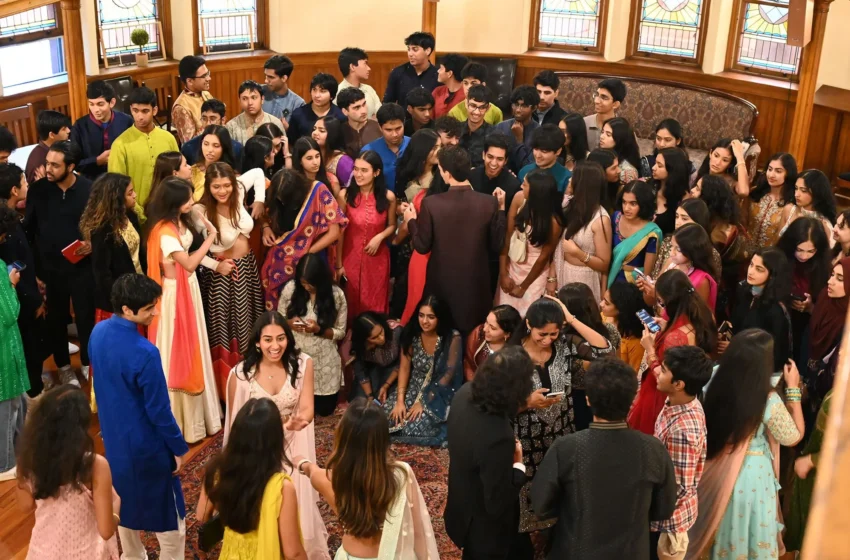Harvard University hosts first-ever South Asian convocation

Photo credit: https://mittalsouthasiainstitute.harvard.edu
More than 200 Harvard students and faculty members gathered on the steps of Widener Library to celebrate the first ever South Asian convocation.
The Sep 21 event – featuring class photos, food, speeches and cultural performances – was organized by the Harvard South Asian Student Association with support from the the University’s South Asia Institute.
The evening started off with class photos for both undergraduate and graduate students, the Harvard Crimson, the student newspaper reported.
“It’s actually everyone, so students, grad students, faculty, affiliates, whoever identifies as being South Asian or enjoys the community,” Nurayn Y. Khan ’26, an event co-organizer, said.
South Asia Institute Executive Director Hitesh M. Hathi said that although the institute typically focuses on academics and research on campus, the goal of the event was “purely social.”
“We decided: ‘Why don’t we combine our welcome back with the first ever convocation?’” Hathi said. “We asked them to make a completely inclusive one, so that all South Asians would feel welcome,” he added.
After taking class photos, students and faculty walked to Harvard-Epworth Church for speeches and student performances from Harvard Bhangra, Harvard Deepam, and the Harvard South Asian Music Association. The event concluded with a dinner and socialization amongst attendees.
READ: Indian American student dramatically goes off-script at Harvard graduation (May 24, 2024)
“South Asians are one of the largest ethnic groups at Harvard, and we felt it was right to have a sort of space to bring everyone together,” Khan said.
Several performers highlighted the diversity of the audience and the performances.
“It’s really common to pursue dance in the South Asian community, so it was just really meaningful to be able to do it in front of such a wide array and diverse group of people,” Alvira Tyagi ’25, who performed with Harvard Deepam, said.
“We came together, we spent late nights in our local dance studio here,” added Tyagi, a Crimson Editorial editor.
“I think it seemed like just the perfect occasion to showcase the diversity of Indian and South Asian music,” Vishnu S. Emani ’26, who performed violin with SAMA, said. “Almost half of the entire performance was just improvised on the spot because that’s just the nature of Indian classical music.”
READ: India Conference at Harvard: Bridging past triumphs to future challenges (February 16, 2024)
Emani noted that performances spanned across South Asia’s wide range of geography and culture. “We had people performing Punjabi dance, the Bhangra style, and also South Indian,” he said.
Hathi said the audience engagement during the performance was “student-led, which was beautiful.”
The South Asian Association is also considering plans for a South Asian commencement ceremony, to create an affinity space for students as they graduate.
“We’ve heard so many times over and over again since our freshman year that students want a convocation, they want a commencement,” event co-organizer Aditi Kona ’26 said.
Organizers of the event said they hope for increased funding from the University to plan more events for South Asian students in future years. “It would be really nice to see the University funding it, or just having support, more awareness,” Kona said.
“I didn’t even realize I was missing this event until they announced it was happening,” Tyagi added.
“I think it’s just really meaningful to, at the crux of it, have time that you spend with people who can relate to your lived experiences, your cultural experiences, and be able to bond with them, even beyond that shared connection and find ways that you are able to interact through dance or art or singing or music,” she added.
Attendees and organizers highlighted the warmth and excitement generated by the event.
“I just think there was a lot of love and enthusiasm in the auditorium,” Hathi said.
“My favorite part, personally, was just everyone coming together and just looking out into the crowd and seeing how many people were there,” Khan said.
